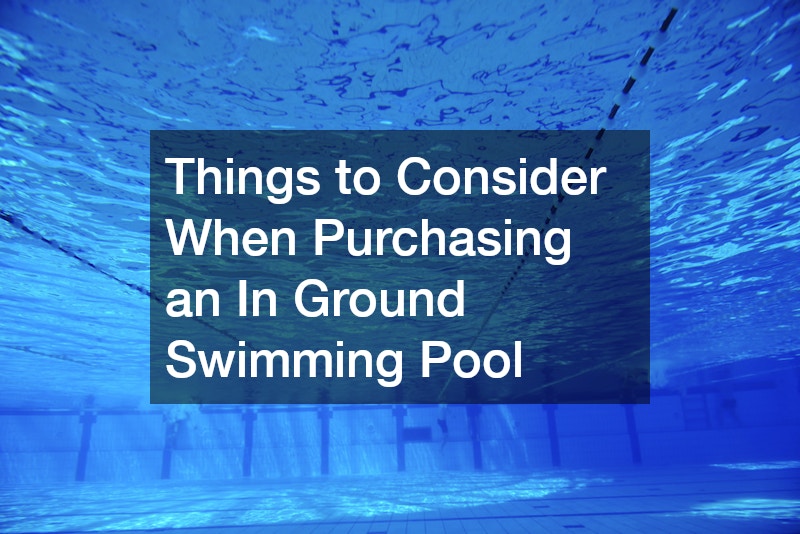
Incorporating an in ground swimming pool into your home is a significant investment that requires careful consideration and planning. This article aims to provide a comprehensive guide to address common questions and aspects to contemplate before diving into this venture. With careful planning, your swimming pool can become a cherished centerpiece in your backyard.
Video Source
Discussing the financial implications of purchasing an in-ground swimming pool entails more than just initial installation costs. The upfront costs can vary significantly depending on the size, design, and additional features of the pool, potentially ranging from tens of thousands to over a hundred thousand dollars. Beyond installation, the financial planning should include considerations for long-term maintenance and potential unexpected expenses such as repairs or updates to comply with safety codes.
One crucial aspect of maintaining financial balance is understanding and planning for the ongoing maintenance costs associated with pool ownership. Regular maintenance helps ensure the pool and its equipment remain in good condition, often requiring a budget for cleaning supplies, water treatment, and periodic professional inspections. Additionally, a properly maintained pool can mitigate the risk of unexpected expenses, though unforeseen repairs due to weather damage or wear can still arise.
Exploring different pool designs allows homeowners to tailor the experience to best suit their aesthetic preferences and functional needs. Pools come in a variety of shapes and sizes, from classic rectangles to freeform designs that blend seamlessly with landscaping. Each design offers unique advantages, such as maximizing the swimming area or enhancing a scenic view, providing personalized enjoyment and satisfaction.
In addition to shape and size, features such as lighting, fountains, and heating can significantly enhance the pool environment and extend its usability. Integrated lighting transforms the pool into a magical evening oasis, while fountains add an elegant touch and serene soundscape. Heating systems provide comfort and extend swimming seasons, making the pool a worthwhile investment in various climates and conditions.
Choosing the right construction materials is pivotal in ensuring the longevity and low-maintenance nature of your pool. Fiberglass is admired for its smooth finish and low maintenance, though it offers less customization in terms of shapes and sizes compared to other options. Concrete pools allow for the most flexibility in design but require more maintenance and can be prone to algae growth and surface cracking.
Vinyl liner pools provide a more budget-friendly option and are relatively easy to maintain, though they might not last as long and are prone to punctures. The choice between these materials often comes down to weighing their cons alongside their benefits, as each offers distinct advantages in terms of durability, cost, and maintenance requirements. Furthermore, staying informed about new technologies or emerging materials can open additional options tailored to individual preferences and locations.
Evaluating local zoning laws and obtaining the necessary permits are essential preliminary steps in the pool installation process. Each municipality has its regulations that dictate pool placement, size, and safety requirements, which can affect the overall design and location of the pool. Additionally, homeowners' associations may have specific rules that mandate certain aesthetic or structural elements, influencing the final plan.
Safety is a paramount concern, necessitating thorough consideration and strategic planning to protect users and comply with regulations. Features such as fencing, pool covers, and alarms are often mandated by law to enhance safety and prevent accidental access or drowning incidents. Incorporating these elements helps ensure both legal compliance and peace of mind, especially for families with young children or pets.
Outlining regular maintenance tasks is vital to prolonging the lifespan and enjoyment of your in-ground swimming pool. Weekly cleaning of the pool's surfaces and balancing the chemical components of the water prevent issues like algae growth and bacteria proliferation. Regular checks on equipment like pumps and filters ensure they operate efficiently, reducing the risk of costly repairs or replacements.
Seasonal care is particularly critical for pools in colder climates, where winterizing procedures protect the pool structure and plumbing from freeze damage. This process typically involves draining equipment, adding antifreeze to plumbing lines, and properly covering the pool, which collectively prevents costly damages over the winter months. Seasonal opening, including thorough cleaning and rebalancing of water chemistry, ensures a smooth transition back to regular use.
As we conclude, it's clear that purchasing an in-ground swimming pool comes with numerous considerations, each crucial in ensuring your investment is rewarding, safe, and suited to your lifestyle. By addressing these questions and planning thoughtfully, you can enjoy the many benefits of pool ownership for years to come. A careful assessment of costs, design preferences, material choices, legal mandates, and maintenance needs ensures a successful and enjoyable pool experience.
.